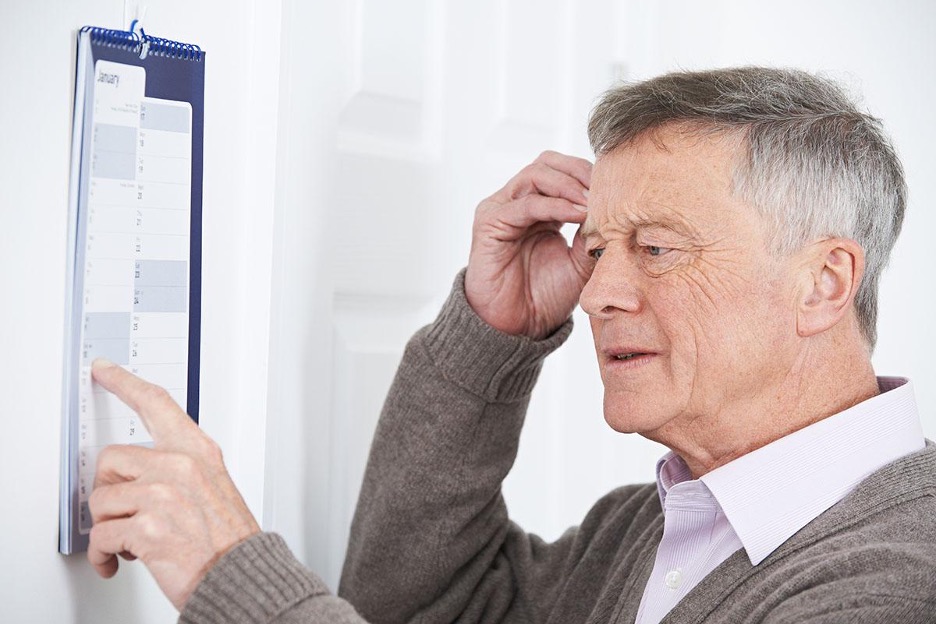What are The Earliest Signs of Dementia?
When it comes to care for the elderly, it can be hard to decipher the difference between natural memory loss from ageing and early signs of dementia. How do you know if the behaviours you are seeing in an ageing loved one are normal? Would you know the early signs of cognitive decline and when it is the right time for care in the home?
The National Institute on Ageing reports that half of people over the age of 85 may have some form of dementia. This does not mean that dementia is an unavoidable part of ageing. There are many people who never display signs of dementia but receiving a diagnosis may be an ongoing concern for them.
Dementia is one of the main reasons that seniors will lose their independence and require in home care. This affects millions of people, with over 50 million people currently living with it. Being aware of the signs of early dementia may allow you to recognise the symptoms in your loved one. Early diagnosis can assist you in getting help, such as in home care, and accessing treatment for your loved one.
Watch for these 12 Early Signs of Dementia: And How to Help When You See Them
As you interact with an ageing loved one, watch for these early signs of dementia and Alzheimer’s. One symptom doesn’t necessarily mean that they are developing dementia. However, several may mean that your loved one needs to be seen by a neurologist. Here are the top twelve early signs and symptoms of dementia.

1. Vision problems
For some, one of the earliest signs of dementia is changes in vision. Your loved one may have trouble reading or seeing the differences in colour or contrast. He or she may also begin to experience trouble judging distances which may lead to problems driving.
You may see that your loved one is struggling to resolve spatial relationships of various types, such as having trouble with the distance between the table and the chair or the distance between a glass and the shelf.
What You Might Notice: While visiting your mum who is ageing in place, you ask her to pass you a paper you see on the light-colored countertop. She looks at you confused and can’t find the paper even though it is clearly visible to you.
How You Can Help: Ask if you can help with decluttering key areas of the house. Remove the things that are not useful. Use items that will stand out on plain surfaces, such as bright coloured cups or placemats.

2. Problems speaking or writing
In the early stages of dementia, it can be difficult for your loved one to follow conversations. You may observe your loved one stopping in the middle of a conversation with no idea how to continue.
They may also struggle to find the right words. We all forget words from time to time and eventually remember them. People with dementia often cannot retrieve the word even after trying many times. Your loved one may also begin to repeat sentences within a conversation or say the same thing repeatedly in a short period of time.
What You Might Notice: You’ve called your dad up to let him know about your plans for Christmas. He sounds agreeable but as you are saying goodbye he says, “When are the kids coming for Easter? I need to buy some…some…box wrapping.”
How You Can Help: If you know what they are trying to say, don’t correct. Just agree and calmly provide the needed word. If they repeat themselves, remember that they are not aware of it. Listen and then continue the conversation in a different direction.
3. Poor judgment.
Dementia can change your loved one’s ability to make good judgments. They might seem like they no longer know what is appropriate in social situations. Your loved one may ask strangers for odd things like a tissue or a coin.
What You Might Notice: When you are visiting with your aunt, she starts to tell the delivery person about how much money she has in her bank account.
How You Can Help: Treat your aunt with dignity and respect, you can join in the conversation quickly and provide a new topic to talk about.

4. Trouble with money
Troubles with finances can indicate the earliest stage of dementia. Managing money requires you to be able to think, remember, and reason. These functions deteriorate with dementia. Whilst ageing in place, your loved one may:
- No longer be able to keep track of spending.
- Buy things but not remember why they did.
- Give money to telemarketers or strangers.
- Leave unpaid bills to stack up.
- Leave an inappropriately large tip or not know how to settle the bill.
What You Might Notice: Your mum calls you in tears saying that her credit card has been denied and she can’t pay for her groceries this month.
How You Can Help: Ask her if you can help her by taking overpaying the bills for a couple of months. Set up a budget together and make sure she has the money she needs on a prepaid credit card.
5. Forgetting the seasons
If your loved one is in the early stages of dementia, he or she may not be able to remember what day, date, or season it is. People with dementia may think they are in a different year, sometimes one in the past.
They may begin to lose the ability to understand that something happened “yesterday” or will happen “tomorrow”. Time begins to shrink, and dementia patients only understand what is happening in the here and now. This confusion can extend to an understanding of place, even if they are receiving care in the home. For example, your loved one may be sitting in your living room, but he or she may think they are in another place entirely – usually another place that is familiar and carries fond memories.
What You Might Notice: It’s a cold, blustery winter morning and you find your neighbour digging in his garden. When you ask, he says he is planting his spring garden even though spring is still months away. How You Can Help: Realise that this is the reality for your neighbour, don’t argue. Check often to make sure he is dressed warmly and safely returns to his house. You can suggest a safer related activity like looking at a seed catalog.

6. Withdrawal from work or social activities
Your usually outgoing loved one may suddenly stop participating in activities, social gatherings, or hobbies. Dementia may make it difficult to remember how to interact or conduct a hobby. In the early stages of dementia, people may realise the changes that are happening and as a result, may avoid social interactions altogether. Noisy and complicated gatherings can make it more difficult for them to cope.
What You Might Notice: Your mum has been a devoted member of her book club for 20 years. When you ask her what book they are reading she says, “I’m not interested in that anymore.”
How You Can Help: Offer a simpler idea of a get-together. Maybe instead of attending a book club, your home care agency nurse at home would be interested in reading the same book and discussing it with her.

7. Forgetting current details
It is normal to occasionally forget what you had for lunch that day, but you should take note if your loved one is consistently forgetful. If you start to notice this type of behaviour more often in a loved one, it may be a symptom of dementia. Although they can recall detailed memories from their childhood, they may forget where they parked the car.
What You Might Notice: Your husband was cheerfully chatting on the phone with your son this morning and after lunch, you ask him how your son is doing. He responds, “I haven’t talked to him recently.”
How You Can Help: Be patient. If he can’t remember the conversation, that is just what it is. Say you will call your son later and talk to him.

8. Getting lost
Another sign of dementia is trouble with following directions. Wandering in seniors is a common symptom of Alzheimer’s, a type of dementia. Your loved one may get lost coming over to your house even though they have visited you many times before.
What You Might Notice: Your wife went out to drop off a package at a close friend’s house. She returns 2 hours later, angry and frustrated stating “I don’t know why they have to make the streets so complicated! Nothing is where it’s supposed to be!”
How You Can Help: Pay attention to the time of the day when your loved one seems to get lost. During these times, plan to avoid travel or busy places. Ask your loved one if they would be willing to wear an ID bracelet or carry a cell phone with a tracking device. Check-in on them if they haven’t arrived by a certain time.
9. Inability to focus
Dementia can make it difficult to focus on a task. Your loved one may start a project and not be able to finish it. You might see this around the house in half-finished tasks. The dishwasher sits half empty or may have dirty dishes mixed with clean! The washing machine could have day-old musty laundry. Your loved one may no longer be able to follow the steps for a recipe or may not be able to follow the plot of a movie or novel.
What You Might Notice: You and your partner have been puzzle enthusiasts for years, the last time you tried to do a puzzle together your partner repeatedly wandered off and when he returned seemed confused by what you were doing.
How You Can Help: Go with the flow. If a puzzle is forgotten, that is okay. Help your partner make up visual lists for completing daily tasks such as emptying the dishwasher or getting ready for the day. Stick with a regular daily routine.
10. Acting out of character
We all change as we move through life, but a clear warning sign of dementia is abrupt changes in your loved one’s personality. Dementia can cause changes in the brain that affect the ability to know what is appropriate.
Someone who has always been careful with their words may start saying whatever pops into their head. This can include often quite rude or sexually inappropriate comments. When your loved one is behaving out of character, it is often because of changes in the brain.
What You Might Notice: Your mum has drilled into you since birth the importance of tact and politeness. She’s never spoken badly of anyone, but the last time you talked to her she said, “Have you noticed how fat your sister has gotten?”
How You Can Help: Try not to get upset. This is the changes in your mum’s brain causing the inappropriate comments. Don’t respond and change the subject to a more appropriate one.
11. Living dangerously
Do you worry about leaving your loved one alone? Often in early dementia, you might notice that your loved one is not making safe decisions and in home care might need to be considered.
What You Might Notice: You might come in to find that a burner on the stove has been left on and the pot of water has boiled dry.
How You Can Help: Plan ahead to avoid disasters. Have the kitchen set up so that your loved one can’t turn on the stove. Remove sharp knives and large glass containers. Consider the support of a home care agency like Home Care Assistance who can monitor the safety of your loved one as they age in place.
12. Unsafe driving
Troubles with driving in seniors can also be a symptom of dementia. Your loved one may get lost while driving in a familiar area. You might also notice that they are running red lights.
What You Might Notice: Your parent’s car has developed new dings and scratches, but your parent denies knowing how they happened.How You Can Help: Offer to help your parent with running errands or give them a ride. A home care agency like Home Care Assistance can also support with running errands or transportation needs.

An Early Signs of Dementia and Alzheimer’s Checklist
Noticing potential signs of dementia or Alzheimer’s in a loved one as they are ageing in place can be stressful. It can help to write down what you see so that you can reference it later when talking to a health professional. Writing down what is normal for your loved one can also help you notice what might simply be normal signs of ageing. Download our checklist so you can keep track of the changes you or your in-home care services can see.

How Carers Can Support a Loved One in the Early Stages of Dementia
In the early stages of dementia, your loved one will often be aware that things are not right. They need you to still treat them as the same person that you know. Don’t automatically assume that they can’t understand, remember, or do things for themselves.
Try to understand how your loved one is feeling, especially as you approach the conversation of increasing the amount of care they will need.
Ask questions about what sort of help your loved one may want. Work together to find solutions to the many challenges that the early stages of dementia will bring.
Most of all, cherish and enjoy the time you have with your loved one. Laugh, dance, and take it slow. You don’t know what the next days will hold so embrace the good in each day you have together.

How to Prevent Dementia
Dementia is not a normal part of ageing. Currently, there is no sure-fire way to prevent dementia, but the risk can be reduced.
Before you start asking yourself, “how do I provide dementia care for a loved one?” or do I need to consider a home care agency, try to understand the signs. If you observe these early signs of dementia in a loved one, talk with his or her GP, and ask for a referral to a neurologist for testing. Early diagnosis can lead to treatment and strategies that can make life easier and less frustrating over the long haul.
Resources
https://www.dementia.org.au/support
As a leading age care provider, Home Care Assistance offers tailored in-home care services for older Australians, enabling them to live happier and healthier lives in the comfort of their own homes.
We offer private and government subsidised Care Packages and have office locations that are a registered NDIS provider. Our Care Workers undergo extensive training in order to deliver unmatched in-home aged care services where people can continue ageing in place. We are proud ambassadors of the My Aged Care government funded aged care program, enabling Australians to successfully navigate the process and gain approval for in-home care support packages. Home Care Assistance offers hourly care, specialised care, Alzheimer’s and Dementia care, hospital to home care, and 24 hour in home care.













